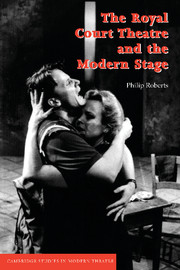Book contents
- Frontmatter
- Contents
- Foreword by Max Stafford-Clark
- Preface
- Acknowledgements
- List of abbreviations
- Biographical notes
- Introduction: abortive schemes, 1951–1954
- 1 Coincidences, 1954–1956
- 2 The struggle for control, 1956–1960
- 3 Conflict and competition, 1961–1965
- 4 A socialist theatre, 1965–1969
- 5 A humanist theatre, 1969–1975
- 6 Changing places, 1975–1979
- 7 Theatre in a cold climate, 1980–1986
- 8 Holding on, 1987–1993
- Afterword
- Notes
- Select bibliography
- Index
4 - A socialist theatre, 1965–1969
Published online by Cambridge University Press: 22 September 2009
- Frontmatter
- Contents
- Foreword by Max Stafford-Clark
- Preface
- Acknowledgements
- List of abbreviations
- Biographical notes
- Introduction: abortive schemes, 1951–1954
- 1 Coincidences, 1954–1956
- 2 The struggle for control, 1956–1960
- 3 Conflict and competition, 1961–1965
- 4 A socialist theatre, 1965–1969
- 5 A humanist theatre, 1969–1975
- 6 Changing places, 1975–1979
- 7 Theatre in a cold climate, 1980–1986
- 8 Holding on, 1987–1993
- Afterword
- Notes
- Select bibliography
- Index
Summary
I think it is a fact that isn't generally appreciated about the Court that there really were, after George and Tony, two very distinct kinds of tradition at the Court. One was Bill, together with Peter Gill. The other was Anthony and myself.
(Lindsay Anderson, interview with the author, 5 December 1984).All of them seemed to me to be non-political animals. The Court had a name for being a radical theatre but it was radical in a rather vague sort of way. It wasn't radical in any sort of way that connects with political philosophy.
(Oscar Lewenstein, interview with the author, 14 December 1983)Before he officially took over as Artistic Director, Gaskill produced on 26 March a position paper in which he reviewed the current state of the theatre. Some important things had changed. These included:
The emergence of the two large-scale permanent companies – The National Theatre and the Royal Shakespeare, playing in repertoire modern as well as classical plays.
The decline of the West End Theatre as a home for straight plays.
The death of weekly rep and the growth of two or three weekly rep companies and the raising of the standard of plays (though not necessarily of the performance) in the provinces'.
The theatre world had moved on since Devine began the venture, and the Court needed to reassess its position. The danger was that of innovator being overtaken. In particular, the question of ‘classic plays’ was to recur.
- Type
- Chapter
- Information
- The Royal Court Theatre and the Modern Stage , pp. 105 - 128Publisher: Cambridge University PressPrint publication year: 1999



